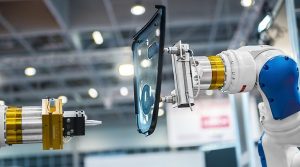
Industrial revolution took off somewhat like these. Initially, it was mechanization, then mass production on the assembly line then came computers. Now, it’s time for the fourth industrial revolution with IoT, cloud and cognitive computing. Popularly known as Industry 4.0 or I4.0
What Is Industry 4.0
Advancement in Artificial intelligence (AI) and Information Technologies along with improved genetics, neuroscience, synthetic biology, and renewed physical science concepts leads to Industry 4.0 (I4.0), the Fourth Industrial Revolution. Now it’s the age of digitization. Age of IoT. Age of Artificial intelligence (AI). The IoT allows objects to be controlled remotely or sensed across existing network infrastructure. When linked with actuators and sensors, it can encompass technologies like smart homes, smart cities, and intelligent transport system and so on. Incorporating Industry 4.0 has the ability to completely change the workings of the manufacturing industry.
How Beneficial Is Industry 4.0
Industry 4.0 is so far expected to have mixed effects. On one hand, it promises improvements in the manufacturing segment.Whereas, it also consists of geoengineering, i.e., technology to alter planetary conditions, causing climate change and global warming. I4.0 helps to produce goods more efficiently, with improved flexibility, technological breakthroughs and so on. It is going to change the way we live, communicate and work. As of now, online shopping or delivery services by drone have already redefined retail experience. Automated vehicles have started reshaping the living spaces of cities, architecture, roads, and free up space for more social and human-centered spaces. With Industry 4.0 people can lead longer and healthier lives via advanced bio-medicine. With AI on its side, I4.0 will transform many jobs—and spawn new jobs that drive economic growth. However, workers with less education and fewer skills will be on the leeward side of it.
In a way, Industry 4.0 can be described as ‘Automation of Automation’. This means the automated execution of the already automated engineered process. It has already started taking its baby steps. Effects of the fourth industrial revolution go beyond Artificial Intelligence. Embracing it leads to new ethical challenges, requiring a new set of laws. AI has so far made decision-making easy with their algorithm. But is it possible to ensure that the algorithms are fairly designed? There may be privacy issues.In the coming decades, potential negativism of Industry 4.0 must be kept track of like: employment, privacy, equality. We must design technologies keeping ethical application in mind. As our capabilities, our identities, and our potential will all evolve along with the technologies we create.